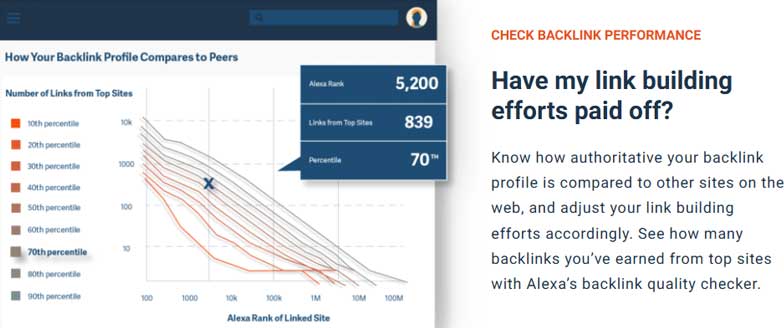The new app is called watchGPT and as I tipped off already, it gives you access to ChatGPT from your Apple Watch. Now the $10,000 question (or more accurately the $3.99 question, as that is the one-time cost of the app) is why having ChatGPT on your wrist is remotely necessary, so let’s dive into what exactly the app can do.
NEWS
Amazon Alexa SEO Tools Is Closing via @sejournal, @martinibuster
Alexa.com announced that it will be retiring its marketing services after 25 years. Founded in 1996, Alexa was subsequently acquired by Amazon in 1999. It was initially known for providing rankings based on traffic measured through a toolbar but Alexa eventually expanded to provide a full suite of marketing products including site auditing and backlink checking.
Screenshot From Alexa Content Marketing


Alexa Rank
Alexa.com provides a full suite of search marketing tools. However what it’s mainly known for is their Alexa Rank.
Advertisement
Continue Reading Below
Alexa Rank is a metric that offers a measurement of site popularity.
In the early 2000s the data was collected via an Alexa toolbar that users downloaded and surfed with. The toolbars collected web traffic information from the users which fed into the Alexa Rank site popularity metric.
Web publishers could also install a script on their site that reported traffic which could then be used to raise their Alexa Rank scores.
The Alexa Rank scores were generally viewed with suspicion because some people claimed that installing the toolbar and visiting ones own sites could result in dramatically raising the Alexa Rank score.
Advertisement
Continue Reading Below
Another criticism of Alexa Rank was that the data was more relevant for Asian countries than in English speaking countries. This was based on the rumor that the Alexa toolbar use base was heavily weighted towards users in Korea and not users in English speaking countries like the United States, Canada, Australia, New Zealand and the UK.
The negative reputation of Alexa Rank and anything offered by Alexa was sealed by 2005.
One search marketer in a 2005 forum discussion remarked:
“Isn’t it time for Amazon to throw in the towel on Alexa? For a company that does so many things well, Alexa is really a blight on their reputation. Why would they want to be associated with such garbage.”
Nevertheless, use of the Alexa Rank metric continued to be used by a dwindling amount of search marketers.
For example, to this day there are some companies that offer affiliate programs and use Alexa Rank to determine the popularity of potential affiliate partners and will not accept affiliates whose websites do not reach a minimum Alexa Rank popularity threshold.
Alexa Was More Than A Site Popularity Ranking Metric
It might come as a surprise to many that Alexa offered a complete suite of search marketing and analytics programs.
For some reason the Alexa suite of online marketing tools, which included a backlink checker, was almost kept as a secret, with apparently no outreach to the search marketing community or seemingly no promotional activity to speak of.
Advertisement
Continue Reading Below
Alexa crawled the entire Internet and for many years provided snapshots of the Internet to Archive.org. It’s backlink information was extensive.
Because of that it was able to offer services like showing which backlinks competitors have in common, including as many as ten competitors at a time.
Screenshot Of An Alexa Backlink Information Page
 The Alexa $149/month plan offered:
The Alexa $149/month plan offered:

- Content Exploration
- Competitive Content Analysis
- Topic Research
- Top Publishers by Topic
- Competitive Analysis
- Competitor Keyword Matrix
- Keyword Difficulty Tool
- Keyword Share of Voice
- Organic Keywords
- Paid Keywords
- Site Audits
- On-Page SEO Checker
- Competitor Backlink Checker
- Backlink Checks
- Audience Analysis
Advertisement
Continue Reading Below
Alexa.com Retired
Alexa announced that it will all be going away on May 1, 2022.
The announcement was short and with no explanation as to what led to the decision.
“Twenty-five years ago, we founded Alexa Internet. After two decades of helping you find, reach, and convert your digital audience, we’ve made the difficult decision to retire Alexa.com on May 1, 2022.
Thank you for making us your go-to resource for content research, competitive analysis, keyword research, and so much more.”
Alexa offered a powerful suite of SEO and marketing tools and it’s sad to see them go away.
Many people didn’t know about the tools and perhaps it might still be around if it had been promoted better.
Advertisement
Continue Reading Below
Citations
Official Alexa.com Announcement
We will be retiring Alexa.com on May 1, 2022
Archive.org Snapshot of Alexa.com Search Marketing Offerings
Archive.org Snapshot of Alexa Backlink Checker Tool
Facebook Faces Yet Another Outage: Platform Encounters Technical Issues Again

Uppdated: It seems that today’s issues with Facebook haven’t affected as many users as the last time. A smaller group of people appears to be impacted this time around, which is a relief compared to the larger incident before. Nevertheless, it’s still frustrating for those affected, and hopefully, the issues will be resolved soon by the Facebook team.
Facebook had another problem today (March 20, 2024). According to Downdetector, a website that shows when other websites are not working, many people had trouble using Facebook.
This isn’t the first time Facebook has had issues. Just a little while ago, there was another problem that stopped people from using the site. Today, when people tried to use Facebook, it didn’t work like it should. People couldn’t see their friends’ posts, and sometimes the website wouldn’t even load.
Downdetector, which watches out for problems on websites, showed that lots of people were having trouble with Facebook. People from all over the world said they couldn’t use the site, and they were not happy about it.
When websites like Facebook have problems, it affects a lot of people. It’s not just about not being able to see posts or chat with friends. It can also impact businesses that use Facebook to reach customers.
Since Facebook owns Messenger and Instagram, the problems with Facebook also meant that people had trouble using these apps. It made the situation even more frustrating for many users, who rely on these apps to stay connected with others.
During this recent problem, one thing is obvious: the internet is always changing, and even big websites like Facebook can have problems. While people wait for Facebook to fix the issue, it shows us how easily things online can go wrong. It’s a good reminder that we should have backup plans for staying connected online, just in case something like this happens again.
NEWS
We asked ChatGPT what will be Google (GOOG) stock price for 2030

Investors who have invested in Alphabet Inc. (NASDAQ: GOOG) stock have reaped significant benefits from the company’s robust financial performance over the last five years. Google’s dominance in the online advertising market has been a key driver of the company’s consistent revenue growth and impressive profit margins.
In addition, Google has expanded its operations into related fields such as cloud computing and artificial intelligence. These areas show great promise as future growth drivers, making them increasingly attractive to investors. Notably, Alphabet’s stock price has been rising due to investor interest in the company’s recent initiatives in the fast-developing field of artificial intelligence (AI), adding generative AI features to Gmail and Google Docs.
However, when it comes to predicting the future pricing of a corporation like Google, there are many factors to consider. With this in mind, Finbold turned to the artificial intelligence tool ChatGPT to suggest a likely pricing range for GOOG stock by 2030. Although the tool was unable to give a definitive price range, it did note the following:
“Over the long term, Google has a track record of strong financial performance and has shown an ability to adapt to changing market conditions. As such, it’s reasonable to expect that Google’s stock price may continue to appreciate over time.”
GOOG stock price prediction
While attempting to estimate the price range of future transactions, it is essential to consider a variety of measures in addition to the AI chat tool, which includes deep learning algorithms and stock market experts.
Finbold collected forecasts provided by CoinPriceForecast, a finance prediction tool that utilizes machine self-learning technology, to anticipate Google stock price by the end of 2030 to compare with ChatGPT’s projection.
According to the most recent long-term estimate, which Finbold obtained on March 20, the price of Google will rise beyond $200 in 2030 and touch $247 by the end of the year, which would indicate a 141% gain from today to the end of the year.
Google has been assigned a recommendation of ‘strong buy’ by the majority of analysts working on Wall Street for a more near-term time frame. Significantly, 36 analysts of the 48 have recommended a “strong buy,” while seven people have advocated a “buy.” The remaining five analysts had given a ‘hold’ rating.

The average price projection for Alphabet stock over the last three months has been $125.32; this objective represents a 22.31% upside from its current price. It’s interesting to note that the maximum price forecast for the next year is $160, representing a gain of 56.16% from the stock’s current price of $102.46.
While the outlook for Google stock may be positive, it’s important to keep in mind that some potential challenges and risks could impact its performance, including competition from ChatGPT itself, which could affect Google’s price.
Disclaimer: The content on this site should not be considered investment advice. Investing is speculative. When investing, your capital is at risk.
NEWS
This Apple Watch app brings ChatGPT to your wrist — here’s why you want it

ChatGPT feels like it is everywhere at the moment; the AI-powered tool is rapidly starting to feel like internet connected home devices where you are left wondering if your flower pot really needed Bluetooth. However, after hearing about a new Apple Watch app that brings ChatGPT to your favorite wrist computer, I’m actually convinced this one is worth checking out.
-

 SEO7 days ago
SEO7 days agoGoogle Limits News Links In California Over Proposed ‘Link Tax’ Law
-

 SEARCHENGINES6 days ago
SEARCHENGINES6 days agoGoogle Core Update Volatility, Helpful Content Update Gone, Dangerous Google Search Results & Google Ads Confusion
-
SEARCHENGINES7 days ago
Daily Search Forum Recap: April 12, 2024
-

 SEO6 days ago
SEO6 days ago10 Paid Search & PPC Planning Best Practices
-

 MARKETING6 days ago
MARKETING6 days ago2 Ways to Take Back the Power in Your Business: Part 2
-

 MARKETING4 days ago
MARKETING4 days ago5 Psychological Tactics to Write Better Emails
-

 SEARCHENGINES5 days ago
SEARCHENGINES5 days agoWeekend Google Core Ranking Volatility
-

 PPC6 days ago
PPC6 days agoCritical Display Error in Brand Safety Metrics On Twitter/X Corrected













You must be logged in to post a comment Login